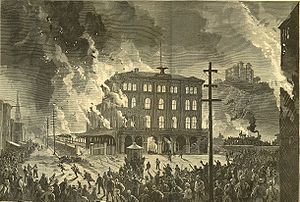Pittsburgh Railway Riots
| Pittsburgh railway riots | |
|---|---|
| Part of Great Railroad Strike of 1877 | |

Burning of Union Depot at Pittsburgh
|
|
| Date | July 19, 1877 – July 30, 1877 |
| Location | Pittsburgh, Pennsylvania |
| Casualties | |
| Death(s) | 61 |
| Injuries | 124 |
| Arrested | 139 |
The Pittsburgh railway riots occurred in Pittsburgh, Pennsylvania as part of the Great Railroad Strike of 1877 in the United States, incidents of strikes, labor unrest and violence in numerous cities across the country, and one of several in Pennsylvania. Other cities dealing with railroad strikes were Philadelphia, Reading, Shamokin and Scranton. The strikes followed repeated reductions in wages and sometimes increases in workload by the railroad companies, during a period of economic recession following the Panic of 1873.
Between July 21 and 22 in Pittsburgh, a major center of the Pennsylvania Railroad, some 40 people (including women and children) were killed in the riots, strikers burned the Union Depot and 38 other buildings at the yards. In addition more than 120 train engines and more than 1,200 rail cars were burned and destroyed. Due to track damage, trains did not run for a week. Estimates of losses ranged from $2 million to $5 million, according to the railroad company and an 1878 report by a state legislative investigative committee. Pittsburgh was the site of the most violence and physical damage of any city in the country during the Great Strike.
The Long Depression, sparked in the US by the Panic of 1873, had far reaching implications for US industry, shuttering more than a hundred railroads in the first year and slashing construction of new rail lines from 7,500 miles of track in 1872 to just 1,600 miles in 1875. Some 18,000 businesses failed between 1873 and 1875, production in iron and steel alone dropped as much as 45%, and a million or more lost their jobs.
The resulting dissatisfaction erupted July 14, 1877 in Martinsburg, West Virginia, and quickly spread to Maryland, New York, Illinois, Missouri and Pennsylvania.
In 1877 there was a prevailing feeling in Pittsburgh that the city was suffering at the mercy of unfair pricing from the Pennsylvania Railroad. The railroad was blamed for costing the city its preeminence in oil refining, and privileging Philadelphia at their expense. Indeed, at this time freight shipped from Pittsburgh to San Francisco cost 20% more than that shipped from New York, and freight rates from Pittsburgh to Philadelphia were identical to that for the 100-mile-longer route from Oil City to Philadelphia.
...
Wikipedia
